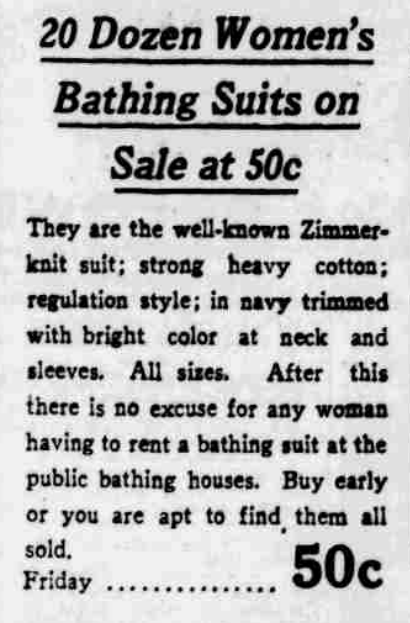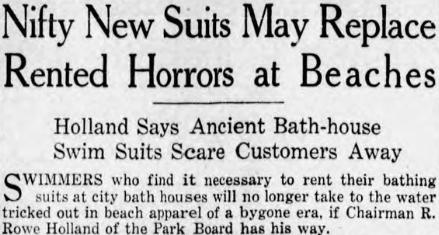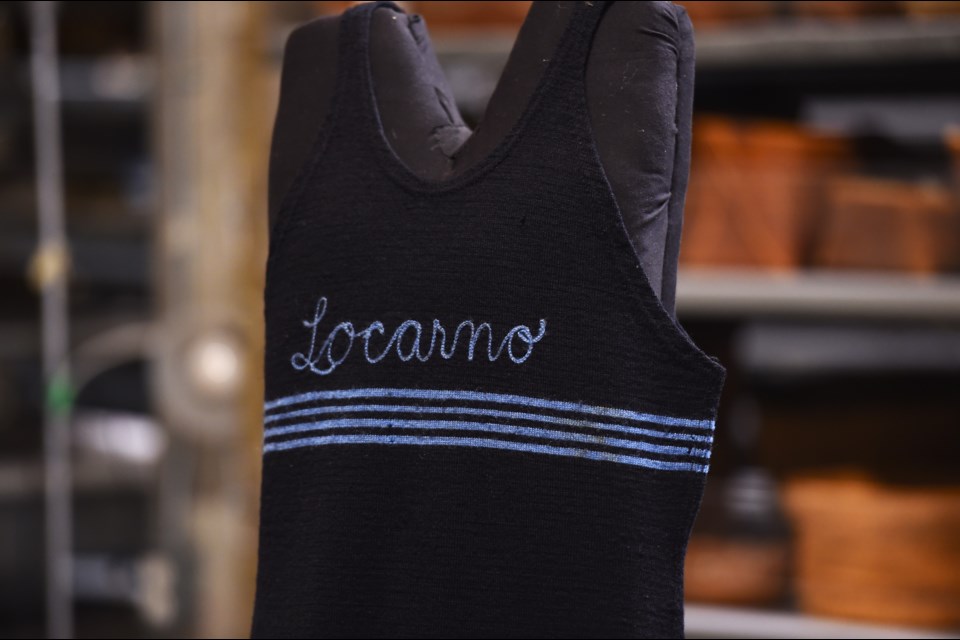Imagine sharing a swimsuit. With thousands of people.
That's essentially what some Vancouverites used to do..with woollen bathing suits.
Diving into Vancouver's swimsuit rental history
It's unclear when the practice started, but in 1913 the city started renting bathing suits out to people at English Bay and Kitsilano beaches.
People lobbied the city for the service, explains Museum of Â鶹´«Ã½Ó³»spokesperson Debby Reis.
"Basically, until 1912, there were private bath houses on the beaches in Â鶹´«Ã½Ó³»and so people would have to rent them from private companies," she tells V.I.A. during an in-person museum visit "And then community groups ended up urging the Â鶹´«Ã½Ó³»Parks board to take over."

The main reason they wanted the city to take over the rental bathing suits service was affordability; it was too pricey to buy them outright for many people, and they felt private companies were gouging them at the beach.
Over the years the program expanded, and, by 1932 one could rent a bathing suit at Second, Locarno and Spanish Banks, along with English Bay and Kitsilano beaches.
Suit systems
To make sure they stayed affordable, suits could be rented for 10 cents per hour. Children's suits were just a nickel per hour, says Reis.
And you could rent a towel as well, also for a nickel. Lockers were a dime.
"Prices varied over the years, but they never seemed to go above 15 cents," Reis tells V.I.A.
Those who used the public bath houses (the precursors to today's change rooms) had to present their swimsuits for inspection before leaving, she adds.
The park board relied somewhat on the public to make sure thefts didn't occur.
"There was a reward for information leading to the conviction of towel and suit thieves," Reis says. "$5 was the reward."
While it may be an obscure piece of history now, the program was quite popular in its day.
"The number of suit rentals peaked in 1920 with 34,784 rentals," says Reis.
Around that time Â鶹´«Ã½Ó³»had around 115,000 residents; Metro Â鶹´«Ã½Ó³»had about 230,000.
"Rented Horrors"
The Museum of Â鶹´«Ã½Ó³»has a selection of suits from the service's earliest days.
They're sort of like rompers: thick, black woollen rompers with the name of the beach they belonged to stitched on as if handwritten. While they look like an undershirt and little shorts, it's actually all one piece with a button on one of the shoulder straps.
Most suits also had a number, to keep track of who had renting which suit.
For the first couple of decades, it appears the look stayed the same, though some changes occurred over time to the suit design.
The rental bathing suit program lasted several decades in Â鶹´«Ã½Ó³»but began to falter in the 1930s. In 1934 there were just 7,784 rentals.
In 1938, the parks board chair, R. Rowe Holland, called wearing them "the mark of Cain" in a Daily Province article that declared them "Rented Horrors."

Of course, the issue wasn't wearing a woollen swimsuit that hundreds if not thousands of strangers might have worn over the previous decade.
It was that they were out of fashion.
"(Holland's) lance is pointed toward a target at which many a dainty miss has cocked an individual snook in the past year or two," reads the article.
"Instead of marching abreast of the times in the matter of swim toggery," it goes on. "Bath houses have sent their patrons out in costumes resembling something lifted from the follies of 1927."
Holland pushed for suits that would be "pleasing to the most particular woman" and that would "make a good shape of the skinniest man."
It should be noted that in 1933 Â鶹´«Ã½Ó³»passed a law that allowed men to be topless at the beach.
New suits in new styles were purchased by the city and the program continued for another 15 years.
"Rentals ended after the summer season...in 1956 at Second Beach, 1958 at Locarno and Spanish Banks, 1963 in English Bay and 1964 in Kitsilano," Reis says.
The end of the program was pegged to the rise of driving cars to the beach; car culture and parking lots, which led to people changing in their vehicles instead of the bathhouses, for which people brought their own suits.
In a report from the 1960s, the parks board notes that when people had to take a streetcar to the beach it made sense to provide expanded services.
"By 1961, the Â鶹´«Ã½Ó³»Parks Board report states that 'with the automobile playing a leading role in present-day life, the type of bathhouse now operating at only English Bay and Kitsilano is unprofitable,'" says Reis.
And with the move from bathhouses to change rooms, the rental bathing suits program ended.



